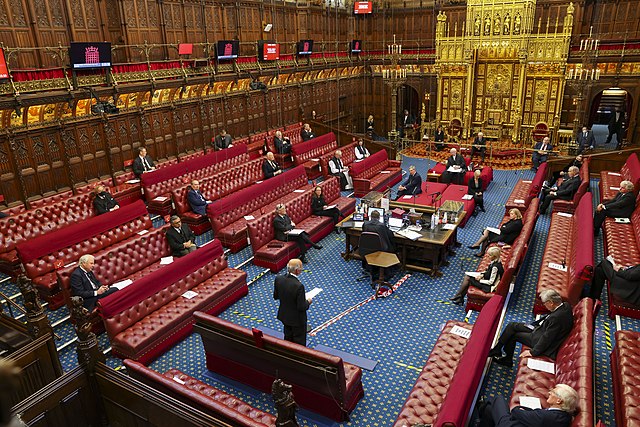Secondary Legislation Scrutiny Committee concerned by Home Office's "inexplicable and inexcusable" failure to provide adequate explanation of HC 997's major reforms
In a report published last week, the House of Lords House of Lords Secondary Legislation Scrutiny Committee strongly criticised the Home Office over its failure to provide adequate information to support the sweeping reforms to the immigration system introduced by the statement of changes to the Immigration Rules (HC 997) released on 1 July.
 Image credit: WikipediaYou can download the Committee's 20-page report here.
Image credit: WikipediaYou can download the Committee's 20-page report here.
The statement of changes brought in far-reaching reforms to the Skilled Worker visa route, including raising the skills thresholds for new applicants to Regulated Qualifications Framework (RQF) level 6, removing the social care sector from the list of eligible occupations, and introducing a new Temporary Shortage List. The Committee notes that the changes removed around 180 occupations from the list of those eligible to sponsor overseas workers. The statement of changes also closed two schemes that had allowed Afghans who supported British operations in Afghanistan to resettle in the UK.
While the Secondary Legislation Scrutiny Committee refrains from expressing a view on the merits of the policy changes themselves, it criticises the Home Office for failing to carry out a consultation in advance of the changes and for failing to produce an impact assessment to accompany the Skilled Worker changes.
The report states: "Given the important changes being made, the absence of an [impact assessment] means that the information provided is deficient and proper scrutiny of the instrument is impossible. This is especially concerning given our exchanges with the Home Office in the recent past on precisely this point."
The Committee described the situation as "inexplicable" and "inexcusable". Lord Watson of Invergowrie, who chairs the Committee, commented: "The restrictions on Skilled Worker visas are expected to lead to a drop of 40% in the grant of these visas. The effects on the care sector may be particularly acute. It is inexplicable that information on the impact of this was not included in the Explanatory Memorandum accompanying the Statement."
The Committee further noted that several key aspects of the operation of the new Skilled Worker visa system remain unknown and important questions remain unanswered, creating uncertainty amongst workers and employers. In the explanatory memorandum accompanying the statement of changes, the Home Office offered only that the changes to skills thresholds were likely to have an "indirect" impact on employers wishing to sponsor workers in roles below RQF level 6. But the Committee questioned the use of the term "indirect," noting that the ability to recruit overseas workers is a direct operational concern for many employers, particularly in sectors already facing acute shortages, such as adult social care.
Pressed by the Committee on why the impact assessment was not ready in time, the Home Office explained that the Immigration Rules had to be laid swiftly following the publication of the White Paper, in part to avoid a last-minute surge in visa applications before the changes took effect. It also cited continued policy discussions across government that left the final shape of the rules uncertain until shortly before they were introduced. While the department insisted that analysis had been conducted during the development of the White Paper, it admitted that a full impact assessment could not be finalised in time.
In written correspondence published alongside the report, the Minister for Migration and Citizenship, Seema Malhotra MP, told the Committee that the delay in publishing an impact assessment was due to "some complexities in finalising the relevant information." However, the Committee found this explanation unsatisfactory, stating: "This suggests that the measures in the Statement were formed before their impact had been fully analysed and understood, leading to a risk that the results may be different from what the department was expecting—a risk exacerbated by the lack of a consultation. This is a sub-optimal way to make policy and is a concern we have raised with the Home Office in the recent past."
Although the Minister did eventually reference limited data contained in an annex to the Immigration White Paper, this information had not been included with the statement of changes itself or in the Home Office's initial responses to the Committee. These figures estimate that raising the skills threshold to RQF level 6 would reduce the number of Skilled Worker main applicants by 17,000 and their dependents by a further 22,000 annually. The removal of the care visa route is projected to account for a further drop of 7,000 applications. Taken together, these changes suggest an overall reduction of about 40% in Skilled Worker visa grants.
The Committee said in response to the provided figures: "These numbers provide a helpful, although incomplete, analysis of the policy and show the significance of the changes; for example, the Home Office expects a drop of around 40% in grants of Skilled Worker visas. However, the estimates were not included in the [explanatory memorandum], or even in the Home Office's initial responses to our questions. This is both inexplicable and inexcusable, the more so as we have highlighted an almost identical situation in the past."
To enable proper scrutiny of the statement of changes by the time it completes its Parliamentary process on 16 September 2025, the Committee said the Home Office should publish the full impact assessment no later than 1 September. "If that is not the case, we will consider inviting the Minister to provide oral evidence soon after to seek the missing information and to ask why the Home Office did not follow proper process," the Committee added.